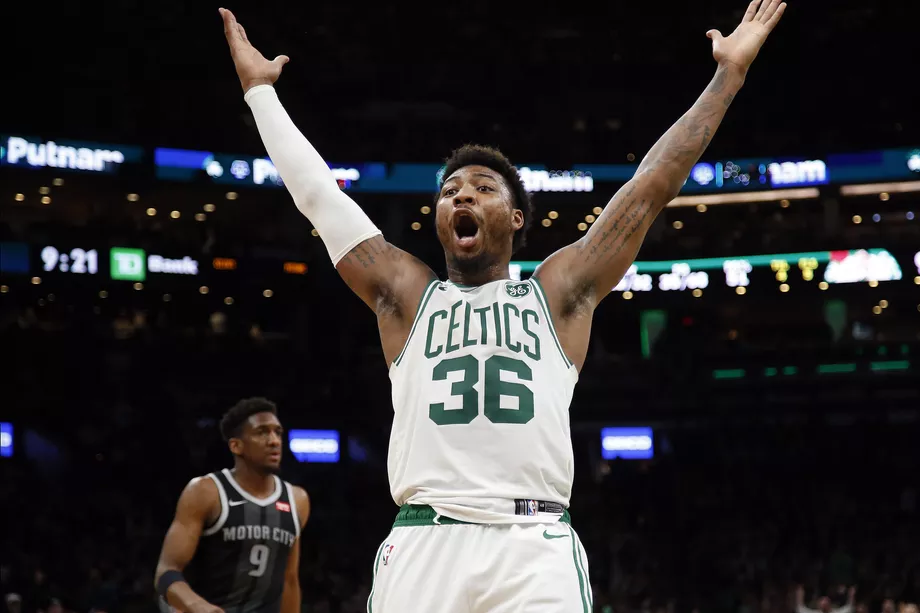Marcus Smart inked a four-year, $52-million deal with the Boston Celtics last summer, inciting some like Sports Illustrated’s Jeremy Woo to declare it a “coup of a contract.” Smart attracted little market leverage against Boston beyond feigned interest from the Kings, unbacked by an offer sheet.
After a frustrating wait for an offer, the money he ultimately received could’ve stemmed from Smart’s unique value to the C’s or to make that contract work better in future trades. No matter Boston’s reason for not sucking every dollar out of him, Smart tipped his cap back to the Celtics by saving their season in the first half of 2018-19. His vocal leadership rang loudly, but that’s been a mainstay on the team.
Now, his consistent play backs it all up.
“He’s been willing to step up and say things since he’s been here,” said Brad Stevens earlier in the year.
It took 20 games for Smart to receive 39 minutes as a starter in Jaylen Brown’s absence against the Pelicans on November 26th. That date will stand as an easily identifiable turning point for a NBA Finals contender that stood at 10-10 arriving in New Orleans.
Smart, who has started every game since, proved in a +12 effort that he may not be a player capable of catapulting a team to championship contention alone, but that he’s an equally important binding force.
Five all-star caliber players, previously unable to gel enough to beat the Knicks, Mavericks, Magicand Jazz (twice), needed his defensive direction, assertiveness, and secondary ball-handling to reach their potential.
An ugly road trip to Florida, Knicks photoshops, Anthony Davis trade deadline drama and locker room dispersions about fun distracted from a positive 12-3 stretch before the All-Star break. Legitimate concerns emerged from two blown 20+-point leads against the Lakers and Clippers, but those issues rest a far cry from a 1-4 west coast swing where the C’s needed a double-digit comeback to top the Phoenix Suns.
Smart, the lone link between this and the Isaiah Thomas teams whose highlights are quick to earn a retweet from nostalgic C’s fans, contrasted a loss to the Trailblazers to teams he played on in the past.
“We’re no longer the hunter. We’re the hunted now,” he said.
In the early “we’ll get it together” phase, Smart identified that a slow start can become a slow season. His locker room musings on the team’s struggles became gospel. Alongside the similarly vocal Kyrie Irving and newly-inserted Marcus Morris, the Celts ripped off eight straight victories and won 27 of 38 games.
Smart shot 37.6 percent from three on 5.1 attempts per game over that stretch. He dished over four assists per game as a secondary ball-handler alongside Irving. As the Celtics rose to a 3rd-ranked (behind Bucks and Warriors) +6.4 net rating (from +2.1 through 10), Smart posted a +5.5 rating in 29 minutes per game. He’s currently 25th in ESPN’s real plus minus (+3.38), surrounded by players earning nearly double his salary like Chris Paul (3.39), Paul Millsap (3.65), Marc Gasol (3.19) and Blake Griffin (3.10).
The fact that Smart’s overall production compares to some of the league’s highest-paid players proved something to those against re-signing him. At 24-years-old, he ultimately had potential to grow beyond the player he was a year ago. His real plus-minus in 2017-18, despite consistently posting “plus” performances, ranked 102nd at 0.96 — below 38-year-old Pau Gasol.
40.2 percent marked Smart’s highest career field goal percentage, his three-point percentage is 5.8 percent above last year (thus a 7.7 percent increase in eFG%). He’s taking nearly three fewer shots per game and is two percentage points shy of 80 percent at the free throw line.
His 0.5 offensive box plus minus is the first positive mark of his career, and pairs with a 1.2 defensive box plus minus in line with his career average. With Smart on the floor this season, the Celts average 113 points per 100 possessions. That’s 11 points higher than any previous year in his career.
More succinctly, Smart became a measurably better basketball player this year alongside his vocal leadership. His shot vastly improved, he’s making a career-high percentage (67.9) of his attempts at the rim and his steal and blocks percentages are career highs.
Paying extra for a player’s second contract in anticipation of them growing through the length of the deal became more common this decade with expanded cap flexibility. Danny Ainge himself signed Avery Bradley above market value and traded Bradley for Marcus Morris, who has gone through a career renaissance of his own in Boston. Not even teams kicking around extra cap space seriously considered Smart expanding beyond the player he was in a larger role.
It’s easy to imagine an executive currently watching Smart’s growth kicking himself that their team didn’t pursue him. For the Celtics, it’s hard to imagine the team recovering from their early hole without his leadership and contributions.
With Irving, they’ve developed one of the more versatile two-way back courts in the NBA. Once viewed as possible contract filler, Smart now figures to be deemed a valuable, necessary piece in any trade because of his realized upside.
For now, signed for the foreseeable future, there’s the chance Smart continues to progress and lead going forward as a career Celtic.
